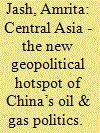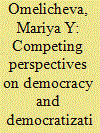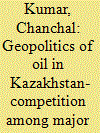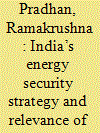|
|
|
Sort Order |
|
|
|
Items / Page
|
|
|
|
|
|
|
| Srl | Item |
| 1 |
ID:
136340


|
|
|
|
|
| Summary/Abstract |
“Salafi”, also known as salafiyya, is derived from the Arabic, meaning“the venerable predecessors”, who are the“first three generations of Islam”. In the different interpretations of the Arabic scriptures,“Salafi” evolved gradually into“Doctrinal, Political and Jihad Salafi”.“Jihadist Salafi”, also known as“Salafi Jihadism”or the“Salafi Global Jihad Movement”, by means of falsification of the religious terms in the Koran and Hadith, bewitched its followers with a message of martyrdom for Islam through violence and“Jihad”, eliminated all the heretics, established Islamic political power and restored“true Islam”religiously. Since 2011, a series of terrorist attacks carried out by“Jihadist Salafi”, represented by Jund al-Khilafah in Central Asia, have posed serious threats to regional security. This not only impacts on the anti-extremism policies and anti-extremism policies of Central Asian countries and severely challenges the SCO and CIS, but also poses a significant threat to the security of China’s Northwest.
|
|
|
|
|
|
|
|
|
|
|
|
|
|
|
|
| 2 |
ID:
135272


|
|
|
|
|
| Summary/Abstract |
Although some Middle Eastern countries, such as Saudi Arabia and Turkey, have tried to influence developments in Afghanistan from time to time, Iran—due to a long common history, geographic proximity, and cultural similarities—is by far Afghanistan's most important neighbor. In this article I seek to demonstrate that Iran, contrary to its image and often even more consistently than pro-Western countries such as Saudi Arabia and Turkey, has since 1979 acted in favor of an independent, centrally and moderately governed Afghanistan. Therefore, Iran will probably also be a stabilizing factor rather than a spoiler in every post–International Security Assistance Force (ISAF) scenario in Kabul.
|
|
|
|
|
|
|
|
|
|
|
|
|
|
|
|
| 3 |
ID:
134504


|
|
|
|
|
| Summary/Abstract |
The article discusses the life, travels, writings and politics of Arminius Vambéry (1832–1913), a noted Hungarian Turcologist. Vambéry's expertise was in the field of Turcology and he invested several years in Istanbul to study it. Afterwards he travelled for close to two years in Central Asia at great personal risk. Hence he disguised himself as a dervish and collected there manuscripts in the Turkic languages. He used these for his research after his return to Budapest, being appointed as a university professor there. Vambéry published numerous books and articles in several languages describing his life and travel experiences as well as many studies in Turkic linguistics and related fields of research. In his later years he published many newspaper articles on patriotic politics which were intended to promote Hungary's interests. Some of his scholarly works, chiefly on the languages and history of Central Asia, are still referred to today by scholars and students in those areas of research.
|
|
|
|
|
|
|
|
|
|
|
|
|
|
|
|
| 4 |
ID:
136828


|
|
|
|
|
| Summary/Abstract |
Since the end of the Cold War and the decline of USSR, Central Asia, rich in oil and gas reserves has become the focus of national interest for global powers.The quest for energy has shifted the balance of power to the Central Asian Republics, making it an energy region of global importance. Of which, China’s increasing footprints in Central Asia, particularly in the energy sector, has drawn wide attention. Whereby, the region has risen from being a marginal factor to that of becoming a top priority in China’s foreign policy. It is guided by China’s vital interests to meet its expanding energy needs which face a supply crisis. In this dynamic, Central Asia has become a geopolitical opportunity for China to fulfil its political and economic objectives in the international arena.
|
|
|
|
|
|
|
|
|
|
|
|
|
|
|
|
| 5 |
ID:
135091


|
|
|
|
|
| Summary/Abstract |
The author uses the latest theoretical and conceptual approaches to world politics and international security to analyze the Afghan problem. He suggests that certain commonly accepted ideas about the strategic situation in Afghanistan should be reviewed to arrive at more exact interpretations of the “traditional” and “non-traditional” threats and other concepts. He also formulates a concept of systemic securitization for Afghanistan’s future.
|
|
|
|
|
|
|
|
|
|
|
|
|
|
|
|
| 6 |
ID:
136417


|
|
|
|
|
| Summary/Abstract |
This article examines the special features, trends, and dynamics of Iranian-Turkish relations in Central Asia (CA) in anticipation of removal of the sanctions from Iran and transformation of the entire international relations system. It analyzes the specifics of Turkey’s current Central Asian approaches and identifies the key external factors that are influencing the development of its relations with the region’s countries from the outside.
The author examines the new aspects of Ankara’s Central Asian strategy from this viewpoint, as well as the Islamic Republic of Iran’s (IRI) role in it. The author also stresses the importance of what she considers to be the main factors: Euro-Atlantic (the U.S. and EU) and Eurasian (Russia, China).
The article closes by noting that the increasing pragmatism and rationalism in the present approaches of Turkey and Iran is allowing them to establish balanced and restrained cooperation with the CA countries, keeping in mind their common historical-cultural and spiritual heritage, as well as the prospects for potentially mutually advantageous partnership within the framework of the planned New Silk Road energy transportation corridors.
In so doing, Iran or Turkey gaining a stronger position in the current system of relations will depend not only on resolving the current Iranian-American and other interstate problems, but also on the efficiency of their regional strategies and the degree to which the CA countries’ interests are observed.
|
|
|
|
|
|
|
|
|
|
|
|
|
|
|
|
| 7 |
ID:
137383


|
|
|
|
|
| Summary/Abstract |
Though the build-up of China's blue-water fleet is causing consternation in foreign-policy circles, the country's on-going expansion into Russia and the former Soviet Union has scarcely garnered comment. For the past decade, China has used its foreign reserves to acquire strategic assets (principally infrastructure and natural resources) and tracts of sovereign territory along its existing borders and increasingly further afield. The impact on targeted countries (and, in turn, their own foreign policy) is extreme, with serious implications for security and economics far beyond their borders. This article provides an overview of China's acquisitions and investments in Eurasia, followed by more detailed discussion of recent developments and responses in Central Asia, Ukraine and Mongolia, and Siberia. It then looks at the impact of China's actions on Sino-Russian relations, discusses the importance of Russia and Central Asia as a resource corridor and buffer zone between Europe and China, and suggests how these manoeuvrings might result in long-term benefits for China.
|
|
|
|
|
|
|
|
|
|
|
|
|
|
|
|
| 8 |
ID:
137088


|
|
|
|
|
| Summary/Abstract |
This study examines alternative understandings of democracy and democracy promotion advanced by the US, EU, Russia and China in Central Asia using frame analysis. In the context of this study, ‘frames’ refer to the relatively cohesive sets of beliefs, categories and value judgements as well as specific ways in which these ideas are packaged for the targets of international democratization. The study assesses the implications of alternative representations of democracy promotion and competing models of governance for the prospects of democratization in Central Asia. It concludes that the substance of US and EU democracy promotion in Central Asia has neglected the cultural and political contexts of these states, while the Russian and Chinese models of governance and development have provided a better match to the interests of the ruling elites
|
|
|
|
|
|
|
|
|
|
|
|
|
|
|
|
| 9 |
ID:
136796


|
|
|
|
|
| Summary/Abstract |
That was a November like none other in the history of Kyrgyzstan. In terms of political intensity and fervor, November 2006 was grueling, fueling speculation about an impending change in the system of governance. Coup or compromise?
|
|
|
|
|
|
|
|
|
|
|
|
|
|
|
|
| 10 |
ID:
136649


|
|
|
|
|
| Summary/Abstract |
This article addresses the question of why regional cooperation among Afghanistan’s neighbours has been so difficult despite these countries’ common concerns. To answer this question, Afghanistan is conceptualised as placed at the core of overlapping regions: South Asia, the Middle East, Central Asia and, through China’s influence, East Asia. Over the past decade, interactions among different regions ‘through’ Afghanistan have increased, and overlap has intensified. Each of these regions is characterised by more or less intense balance-of-power security dynamics, which have played out in Afghanistan. The fact that the regions that overlap in Afghanistan are predominantly characterised by patterns of conflict helps to explain the difficulties of regional cooperation
|
|
|
|
|
|
|
|
|
|
|
|
|
|
|
|
| 11 |
ID:
136825


|
|
|
|
|
| Summary/Abstract |
Energy has emerged as the most important factor to shape geopolitics of Eurasia not only due to its value as a COMMODITY in supply but due to its role as an instrument to advance the strategic goals of global and regional powers in the Eurasian space. Central Asia due to its vast energy wealth is nowadays considered to be the key to the security of Eurasia. During the Cold War, Central Asian region was largely perceived as a peripheral space within the Soviet Union. The sameEurasian space has now become the object of the so-called ‘New Great Game’. This article will critically analyse Mackinder’s Heartland theory and will study what does the metaphor-New Great Game refer to. However, more than that, it is important to ask to what extent ‘New Great Game’ is correctly used to describe the geopolitical context and atmosphere of competition for access to the black gold in Central Asia. It is probably a myth that has been overtly or covertly nourished by novelists and commentators of geopolitics.
|
|
|
|
|
|
|
|
|
|
|
|
|
|
|
|
| 12 |
ID:
136830


|
|
|
|
|
| Summary/Abstract |
Central Asia has emerged as an important source of energy and strategic arena for the major powers of U.S., Russia and China where energy diplomacy has forged a major thrust in their foreign policy. Energy diplomacy in Central Asia is defined by the competition among various stakeholders and the mediation by the state in making the deal. Moreover, the energy diplomacy shares two common assumptions i.e. actors and factors. So, in the game of energy diplomacy in Central Asia, there are so many global and regional players involved out of which India is one of them. But in this game, how India has sought to strengthen its position with the involvement of major powers for accessing huge amount of energy resources from the region is lucidly explicated. Nevertheless, the article promptly attempts to draw a picture on India’s approach in Central Asian energy diplomacy.
|
|
|
|
|
|
|
|
|
|
|
|
|
|
|
|
| 13 |
ID:
136420


|
|
|
|
|
| Summary/Abstract |
When the Soviet Union collapsed, newly independent states appeared on the shores of the Caspian and in expanses of Central Asia, the horizons of which have significantly widened due to the development of hydrocarbon reserves. This has been essentially promoted by the formation of export pipelines in the east-west direction. We will note that the Soviet pipeline system was created in the north-south direction and intended for managing flows of oil and gas in the interests of the entire state. As for the new hydrocarbon-rich states of the Caspian Region and Central Asia, changing the direction of energy flows has become a key task of their foreign and domestic policy. It is no accident that in the last 15-20 years, regional and extra-regional players have become involved in an extremely intense fight for access to the Caspian’s oil and gas, as well as actively engaged in building infrastructure for their transportation to the consumers.1
At the same time, despite the many forecasts of various research centers and oil and gas companies, the production of hydrocarbons and implementation of pipeline projects has been very slow. The reasons for this include the lack of modern technology in the production branches, undeveloped infrastructure, insufficient financing, and low demand for hydrocarbons from extra-regional states. This is why the forecasts about hydrocarbon production volumes and delivery deadlines from the Caspian Region and Central Asia to the external markets are largely unreliable.
Nevertheless, in the past 20 years, the Caspian and Central Asian countries have succeeded in forming new energy flows and their fields are capable of satisfying the growing needs of the European countries and China for oil and gas.
Among the large-scale hydrocarbon delivery projects being discussed, special mention can be made of the Southern Gas Corridor, the Trans-Caspian Hydrocarbon Transportation System, the Kazakhstan Caspian Transportation System, and the Great Energy Road, each of which is a separate pipeline. These projects are aimed at creating a new pipeline structure called upon to ensure the delivery of hydrocarbons in the east-west direction.
Energy flows are irrevocably tied to the hydrocarbon resources of Kazakhstan (the gas condensate field of Karachaganak and the oil fields of Kashagan and Tengiz), Turkmenistan (the gas field of Galkynysh), and Azerbaijan (the oil field of Azeri-Chirag-Gunashli and the gas field of Shah Deniz).
|
|
|
|
|
|
|
|
|
|
|
|
|
|
|
|
| 14 |
ID:
136823


|
|
|
|
|
| Summary/Abstract |
The energy problem in Turkmenistan is primarily geopolitics and secondarily pipelines. The tertiary issues are economic, political and social implications. Gas deposits are strewn over all the country, generating aspirations nationwide for a better living and expectations worldwide how to use Turkmen energy. Turkmenistan has become the centre of attraction in Central Asia for all those who wish to pitch their hopes for energy with it. Proven gas reserves and many of its deposits are located in disputed areas of the Caspian Sea on which littoral states have failed to reach agreement on maritime borders. These fields remain either unexplored or under explored. There is an intense competition for energy security among regional and extra-regional powers. It has unleashed rivalries among large neighbors and distant superpowers. But for regional powers, interests extend much beyond commercial considerations. Turkmenistan being landlocked holds an important position in terms of energy MARKET because for transportation it has to depend on others. Turkmenistan has four pipeline options but all options have pros and cons. The paper is based on empirical studies as the author had visited the place and had interactions with high officials and laymen that helped frame the paper to deal with various aspects as to how sale of energy to outside world could improve the socio-economic condition of Turkmenistan.
|
|
|
|
|
|
|
|
|
|
|
|
|
|
|
|
| 15 |
ID:
136822


|
|
|
|
|
| Summary/Abstract |
Central Asia has had its fair share of disputes between littoral states since its emergence from the former Soviet Union. Each state has subsequently sought to consolidate power in the region, using these disputes as leverage. Each incident that arises leads to new power struggles and fresh points of dispute between countries on topics such as economics, religion, politics and nationalist ideals. One important geopolitical consequence of the demise of the Soviet Union was the rise of an intense political and commercial competition for control of the vast energy resources of the newly independent and vulnerable states of the Caucasus and Central Asia.
|
|
|
|
|
|
|
|
|
|
|
|
|
|
|
|
| 16 |
ID:
135751


|
|
|
|
|
| Summary/Abstract |
The northwestern Chinese region of Xinjiang is experiencing ongoing violent unrest but remains an economic gateway to Eurasia. Sarah Lain examines China’s policy to improve security and economic cooperation with its central Asian neighbours.
|
|
|
|
|
|
|
|
|
|
|
|
|
|
|
|
| 17 |
ID:
136816


|
|
|
|
|
| Summary/Abstract |
Central Asia having emerged as an important region of global energy scenario becomes a target of the Great Game Politics. While the presence of hydrocarbon resources were relatively known during the Soviet era, entry and explorations by major energy giants of the West during the last two decades has confirmed that Central Asia will be an additional, though not an alternative source for their growing energy needs. The Western firms initiated the politics and process of Multiple Pipeline network to have access to energy of Central Asia which has generated competition and conflict among major players. Being its southern underbelly, Russia’s energy giants with strong support of leadership, have been aggressively pursuing their economic and political interests in Central Asia. China has emerged as a major power having worked out a well planned and funded roadmap in Central Asia’s energy sector to meet its fast increasing demand. Russia and China have commonality of interests to counter the West which is keen to enhance its presence and acquire oil and gas bypassing Russia. The West is supported by leadership of Central Asia who want to diversify their market and promote their national interest. India, though late and not a major player, having close and cordial relations with the CAS, can and should explore various alternatives to meet its growing energy security needs from Central Asia.
|
|
|
|
|
|
|
|
|
|
|
|
|
|
|
|
| 18 |
ID:
136827


|
|
|
|
|
| Summary/Abstract |
In conclusion, India doesn’t have any country specific policy towards the Central Asian region. It needs to develop that part of its engagement with the region. Additionally, China cannot be ignored while dealing with Central Asia, as it largely factors in the regional trajectory of the region. India needs to include Chinese relevance in its Central Asian policy. India has already price for its in activeness and lack of broad vision in Kashmir, Tibet, Xinjiang, Myanmar and many more. It shouldn’t repeat them again in Central Asia.
|
|
|
|
|
|
|
|
|
|
|
|
|
|
|
|
| 19 |
ID:
135725


|
|
|
|
|
| Summary/Abstract |
Shaivism is one of the oldest belief systems in the world. The remnants as well as existing temples in Thailand, Laos, Champa (Vietnam) Indonesia, China, Korea, Japan Central Asia and Tibet speak of the spread of Shaivism in the far corners of the world, from its origin in India. In India, the Shaiva tradition continues uninterruptedly. The twelve Jyotirlinga’s situated at different centres from Kashmir to Rameshwaram stand to prove its widespread existence. The names of the regions like Telegu region;1 Trissur2 in Kerala come from names of Shiva, and Shiva temples exist in huge numbers in the map of India which also includes Nepal. Its form and traditions may though differ from region to region. The most common image is the one described in Sangam Literature, a deity with three eyes, blue throat, and matted hair decorated with goddess Ganga and a crescent moon. The supreme one with a divine consort.
|
|
|
|
|
|
|
|
|
|
|
|
|
|
|
|
| 20 |
ID:
135858


|
|
|
|
|
| Summary/Abstract |
The perception of Central Asia and its place in the world has come to be shaped by its large oil and gas reserves. Literature on energy in the region has thus largely focused on related geopolitical issues and national policies. However, little is known about citizens’ needs within this broader context of commodities that connect the energy networks of China, Russia and the West. This multidisciplinary special issue brings together anthropologists, economists, geographers and political scientists to examine the role of all forms of energy (here: oil, gas, hydropower and solar power) and their products (especially electricity) in people's daily lives throughout Central Asia and the Caucasus. The papers in this issue ask how energy is understood as an everyday resource, as a necessity and a source of opportunity, a challenge or even as an indicator of exclusionary practices. We enquire into the role and views of energy sector workers, rural consumers and urban communities, and their experiences of energy companies’ and national policies. We further examine the legacy of Soviet and more recent domestic energy policies, the environmental of energy use as well as the political impact of citizens’ energy grievances.
|
|
|
|
|
|
|
|
|
|
|
|
|
|
|
|
|
|
|
|
|